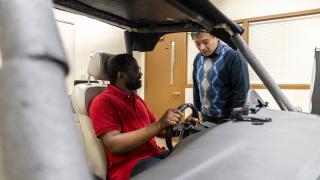
Sociology Professor Emeritus James E. Gruber passed away June 26, but his influence on society from nearly 50 years of equity research and advocacy remains.
Locally, Gruber successfully advocated for paid parental leave on UM-Dearborn’s campus in the early 1990s. Statewide, he served as an expert court witness from local hearings all the way to the Michigan Supreme Court. Nationally, his research was cited in a 1993 case decided by the U.S. Supreme Court, and he worked on court causes on the behalf of the Equal Employment Opportunity Commission. Internationally, Gruber presented his sexual harassment work at a 2005 World Congress.
In a 2016 statement, Gruber — who retired that year — said he became a sociologist “in order to understand the root causes of social and economic inequality” and that “he tried through his research, teaching, and public service to advocate for justice and to give a voice to those who are silenced because of prejudice and discrimination”.
Many of his colleagues considered him a mentor and friend. Helen M. Graves Collegiate Professor of Women's Studies and Social Sciences Suzanne Bergeron considers Gruber both.
She says she saw him and his wife Associate Professor of English Emerita Sheryl Pearson a week before he died. And — even when in hospice — he didn’t want to dwell on himself. He felt there were more important topics to cover during their visit.
“I came for a 20-minute visit and stayed for two-and-a-half hours. It was the last time I saw him; he had so much energy. Jim had just read a New York Times article about transgender identity and he wanted to discuss it. He was fascinated. Even after 50 years researching gender, he felt there were always things to learn.”
Influenced by his primary caregivers — a nurturing grandfather and a hard-working single mother, who was a factory employee during the 1950s — Gruber imagined gender roles through a different lens than many of his baby boomer peers.
When he went to graduate school in the early 1970s during the first-wave feminist movement, he witnessed marches and heard statements given by people who were in the feminist movement and those who were against it. He wanted to apply his sociological training to understanding gender inequity.
Gruber started at UM-Dearborn in 1979. A short time after this appointment, he had his first major publication in what would turn into an influential body of research on the topic of sexual harassment. Titled “Blue Collar Blues: The sexual harassment of women autoworkers,” the article (co-authored with his colleague Lars Bjorn) studied the treatment of women in automotive manufacturing plants.
As Gruber moved along in his career, he continued to look for ways to advance equity during a time when many underrepresented groups didn’t have a voice. On campus, Gruber advocated for his female colleagues by promoting their research and supporting their tenure. Seeing how many of his students were nontraditional and with families, he led an effort to get infant changing stations placed into campus restrooms for both men and women. And he had an impact on his students through his innovative teaching methods.
For example, when an undergraduate class saw state assistance to the poor as a free pass of sorts, Gruber didn’t lecture to tell them otherwise. Instead, he created Project Louise: A simulation exercise where students had the same financial parameters of a single parent with two children on the state system.
The goal was to budget childcare, housing, utilities, telephone, transportation — all while looking for a job. The amount each student had to hypothetically spend was the amount of state aid received at that time. The objective was simple — make the budget work, you pass; if you don’t, you fail.
“At the beginning of the assignment, many thought it would be an easy A,” says Bergeron, who co-taught the Introduction to Women and Gender Studies course with him. “But as the project deadline approached, students started to get nervous because they couldn’t figure out how to get everything they needed and they began to think they were set up to fail. Well, that was the point. If this is how you felt over a grade, imagine what it’s like to live this way. Jim helped them understand.”
Department of Behavioral Sciences Chair Jonathan Smith says Gruber was loved by students in the classroom because of his experiential and discussion-based teaching style. “He was just easy to talk with,” Smith says.
That translated well with colleagues too — Gruber brought a calm demeanor, logical thinking, an open mind and a helping hand to his work on campus.
In addition to the many committees and organizations he served, Gruber was a founding member and teacher in the Women’s and Gender Studies program. He also held numerous administrative and faculty governance positions, notably serving three terms on the CASL Executive Committee, heading Faculty Senate as both chair and vice chair, four years on the University Budget Committee including one year as chairperson, and heading the Provost Search Committee in 2005. In other leadership roles, he served as the associate dean of Interdisciplinary Studies and the director of Sponsored Research.
“Jim was gentle, but fierce. He took the time to listen, rationally think through solutions and then act,” Smith says. “ But he didn’t use force, he used intellect.”
And that intellect, Bergeron says, is with us everyday, helping guide society to be the equitable place Gruber wanted to live in. Even when times feel difficult, Bergeron sees the progress that Gruber helped to create.
“People, regardless of gender, actively supported the U.S. Women’s Soccer in the championship game. Now when I’m out, I see men walking around with women’s soccer team shirts on. Jim would have loved to have seen this. And it reminds me of how far we have come because of Jim and those who he’s influenced to continue this work.”


